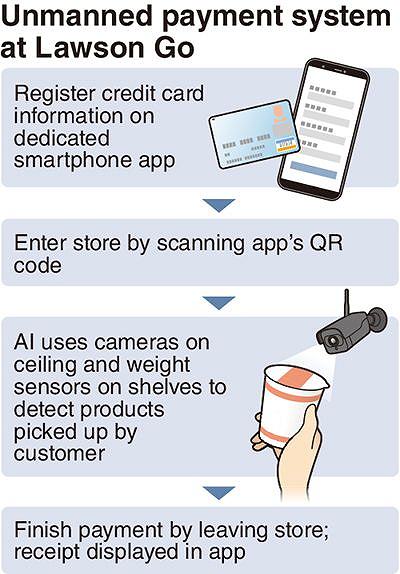November 10, 2022
TOKYO – Major convenience store operators are gradually increasing the number of stores with unmanned payment systems on the resurgence of a serious labor shortage as economic activity recovers from the COVID-19 pandemic.
The companies are aiming to reduce the burden on store employees by eliminating cashier duties.

The Yomiuri Shimbun
In October, Lawson’s unmanned payment store — named Lawson Go — opened in the Mitsubishi Shokuhin Co. headquarters building in Bunkyo Ward, Tokyo. Customers register their credit card information in advance on a dedicated smartphone app and enter the store by scanning the app’s QR code. Artificial intelligence detects the products that customers pick up based on information from cameras on the ceiling and weight sensors on the shelves, so they pay with their registered card simply by leaving the store.
The store’s sales floor is about 11 square meters — about one-eighth the size of a standard store — and sells about 170 items, including rice balls, boxed lunches and beverages. The store can only be accessed by Mitsubishi Shokuhin employees. Store operator Lawson Inc. hopes to open more Lawson Go stores, but mainly in places where customers can be limited, such as hotels and high-rise condominiums, for the time being.
FamilyMart Co. also began operating unmanned payment stores with a system similar to Lawson’s last March, where AI identifies the product picked up. Customers pay at the self-checkout register. The company plans to expand the system to a total of 1,000 stores — including stores with systems that do not use AI — by the end of February 2025.
Increase again?
The industry’s labor shortage was temporarily eased by the influx of personnel from restaurants and other businesses that were forced to shorten hours or close due to the pandemic. Recently, however, an increase in economic activity and more visitors to Japan have once again made it difficult for convenience stores to secure enough workers.
The proliferation of unmanned payment stores is being driven by improvements in technology, in addition to the shortage of workers. Lawson began experimenting with a similar store in 2020 at the Fujitsu Ltd. office in Kawasaki. After putting the full-scale introduction of the system on hold due to the pandemic, the company moved forward after it saw the latest improvements in the performance of sensors and other equipment. At the Lawson Go store, the new system can deal with lightweight products weighing less than 70 grams.
While it is said that the number of convenience stores in Japan peaked at about 55,000, some believe that the unmanned system will be a powerful driver to open new stores because this type can operate in a smaller area than conventional stores.
“Small, unmanned payment stores can be operated by a small number of people. Such stores have great potential to increase,” said a person in the convenience store industry.

